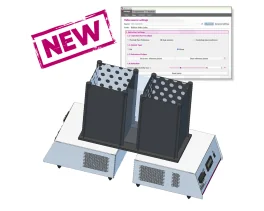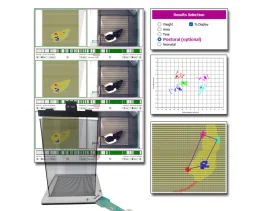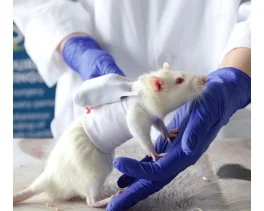Authors
Cha M, Kohan KJ, Zuo X, Ling JX, Gu JG
Lab
University of Cincinnati College of Medicine, OH, USA
Journal
Behav Brain Res.
Abstract
Classical behavioral tests in animal models of trigeminal neuropathic pain measure reflexive responses that are not necessarily measures of pain. To overcome the problem, we created a chronic constrictive nerve injury (CCI) rat model of pain by ligation of the infraorbital nerve (ION), and applied the orofacial operant test to assess behavioral responses to mechanical and cold stimulation in these rats. Animals were trained to voluntarily contact their facial region to a mechanical or a cold stimulation module in order to access sweetened milk as a positive reward. ION-CCI rats displayed aversive behaviors to innocuous mechanical stimuli, as indicated by a significant decrease in both contact time and the numbers of long contact events in comparison with sham group. For cold stimulation, ION-CCI rats displayed aversive behaviors to both innocuous (17 °C) and noxious cold temperatures (12 °C and 5 °C), as indicated by a significant decrease in both contact time and the numbers of long contact events at the cooling temperatures. The decreases of the contact time and numbers in ION-CCI rats were partially abolished by morphine. Our orofacial operant test demonstrates mechanical allodynia, cold allodynia, and hyperalgesia in rats with chronic trigeminal nerve injury. The neuropathic pain in ION-CCI rats was partially alleviated by morphine. Thus, orofacial operant test provides a desirable behavioral assessment method for preclinical studies of chronic trigeminal neuropathic pain.
Source :

 Douleur - Allodynie/Hyperalgésie Thermique
Douleur - Allodynie/Hyperalgésie Thermique Douleur - Spontanée - Déficit de Posture
Douleur - Spontanée - Déficit de Posture Douleur - Allodynie/Hyperalgésie Mécanique
Douleur - Allodynie/Hyperalgésie Mécanique Apprentissage/Mémoire - Attention - Addiction
Apprentissage/Mémoire - Attention - Addiction Physiologie & Recherche Respiratoire
Physiologie & Recherche Respiratoire




































 Douleur
Douleur Système Nerveux Central (SNC)
Système Nerveux Central (SNC)  Neurodégénérescence
Neurodégénérescence Système sensoriel
Système sensoriel Système moteur
Système moteur Troubles de l'humeur
Troubles de l'humeur Autres pathologies
Autres pathologies Système musculaire
Système musculaire Articulations
Articulations Métabolisme
Métabolisme Thématiques transversales
Thématiques transversales Congrès & Meetings
Congrès & Meetings